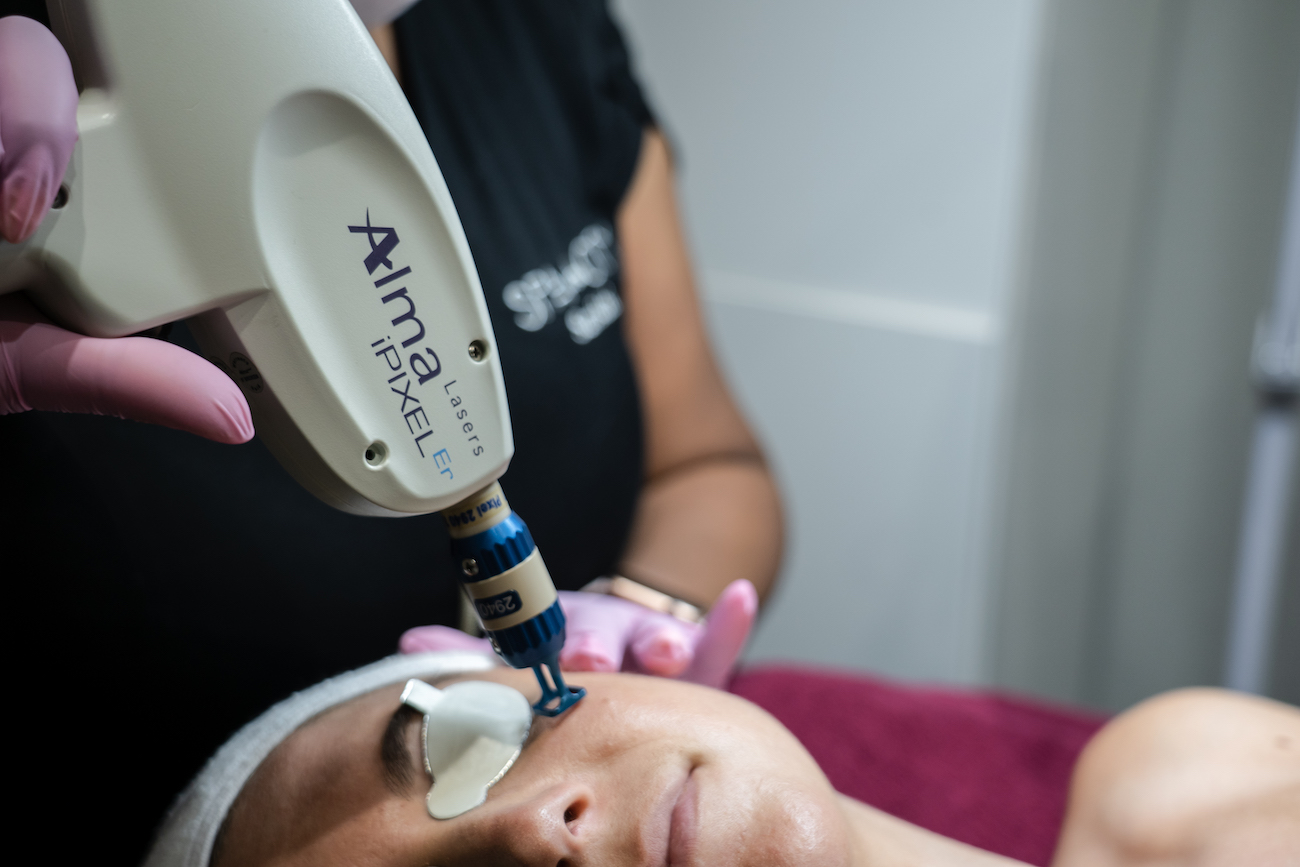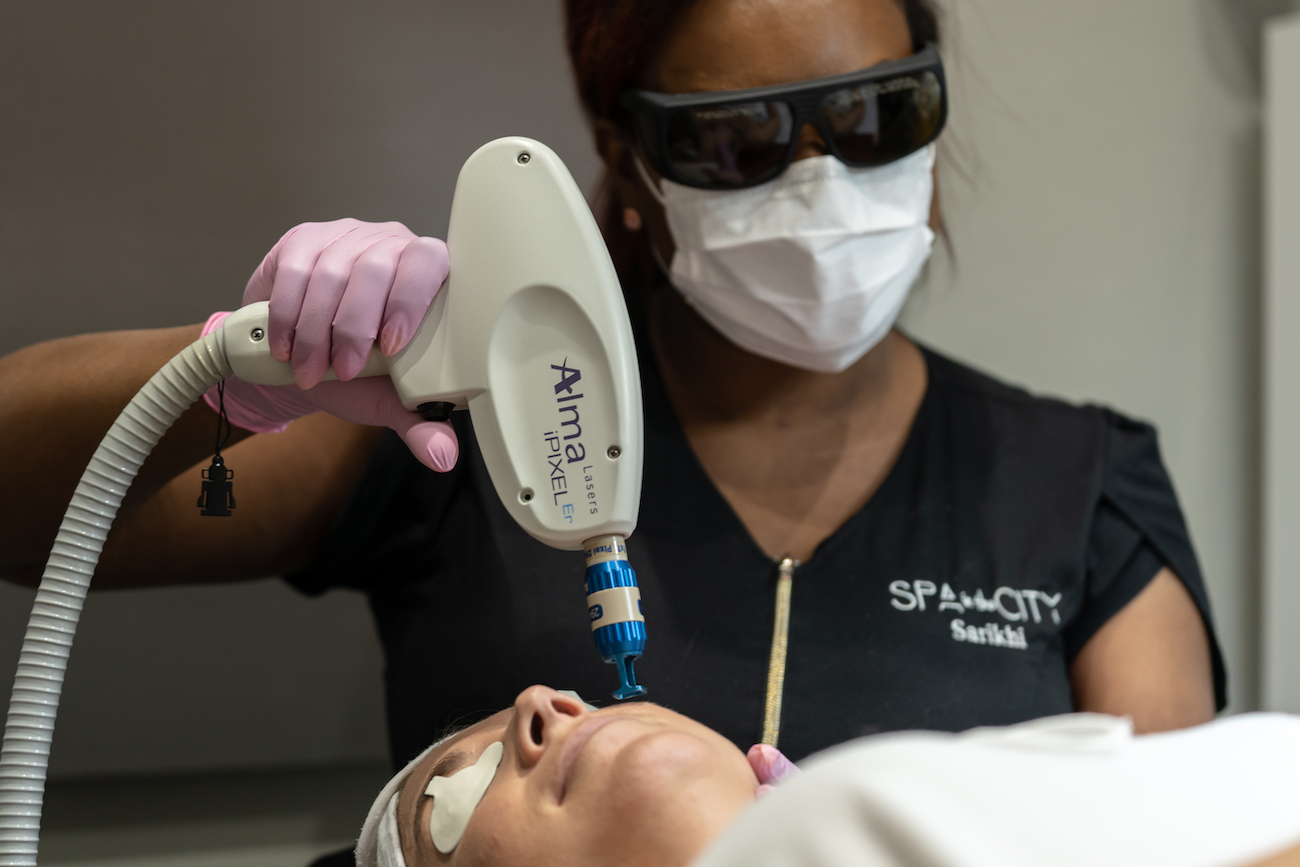Your Laser Skin Resurfacing Questions Answered by Dallas Skincare Specialists
Your Laser Skin Resurfacing Questions Answered by Dallas Skincare Specialists

In recent years, lasers have taken the aesthetic world to new heights. The rise of newer, more effective technology created better outcomes while reducing dangerous risks that once existed. Even still, hearing about laser resurfacing is one thing… taking the first step to getting treatment is a completely different story.
If you’re seriously considering any kind of laser treatment, you may have some doubts and concerns, which is for sure a good thing! That gives you the drive to do much needed research so you can avoid a skincare mishap down the road.
Our Spa in the City laser experts sat down and answered some of our most common laser skin resurfacing questions we receive from clients to guide you in the right direction!
What is laser skin resurfacing?
Laser skin resurfacing is any treatment that uses laser energy to exfoliate dead skin cells for a brighter and renewed complexion. That means there isn’t just one kind of laser treatment, which can be a little confusing for some. Aesthetic lasers come in a wide variety of strengths and applications that affect the outcomes they bring. However, the bottom line always leads to one thing: cellular turnover.
As you can probably guess, skin cells don’t last forever—on average they only survive for about 28 days (cell life cycles vary from person to person). But here’s the catch: those dead cells don’t always go away. Sometimes they like to stick around and dull your complexion, even when your body tries to get rid of them. Dead skin buildup can also lead to textured skin, acne breakouts, and more prominent lines and wrinkles.
Why does cellular buildup happen?
As you age, your body naturally slows its cellular turnover rate, which means old cells cling to the surface longer than you may want. It’s something that happens to all of us, and even with regular at-home exfoliation treatments, your skin may still need an extra boost. In the background are new, fresher cells that rest in the deep layers of your skin (dermis). Laser skin resurfacing helps bring them to light by using light.
When did laser skin resurfacing begin?

Despite what some people may think, laser resurfacing isn’t some new fad. In fact, medical professionals have been using laser technology in aesthetics for decades.
During the 80s and 90s, laser technicians resurfaced photodamaged skin through continuous wave carbon dioxide (CW CO2) lasers. By removing layers of old skin, these lasers gave way to fresher, tighter skin that hasn’t been harmed by sun exposure or other factors.
The results were great at the time, but they also came with additional side effects such as redness, swelling, discoloration, and even loss of skin pigmentation. Good thing that was decades ago!
Here’s the biggest lesson learned from CW CO2 lasers: penetrating the skin with continuous energy does more harm than good.
So, moving on from that…
Researchers quickly found that to reduce thermal damage, they needed pulsed and scanned CO2 systems instead. These penetrate the skin with pulses of laser energy to remove damaged skin in a more controlled manner.
Now, recent expansion in laser technology has given us the chance to safely resurface skin while minimizing the occurrence of negative side effects.
How does laser resurfacing work?
Laser resurfacing works differently than other skin rejuvenation options. You won’t experience any scraping, rubbing, or other traditional means of clearing away dead skin. Instead, laser energy penetrates tissue and heats damaged skin cells to stimulate collagen growth. New cells “resurface,” giving you the ultimate exfoliation treatment.
Without going too deep into the science (that could take forever), on a basic level, lasers implement two main types of wavelengths:
- Non-ablative lasers: Non-ablative wavelengths create controlled thermal heating to the dermis. This promotes collagen production without damaging your skin’s surface (epidermis). The collagen boost can help reduce the appearance of wrinkles and fine lines. Since they are a less invasive option, you won’t have to worry about significant downtime. However, you will probably need multiple sessions to reach your desired look.
- Ablative lasers: For a dramatic treatment, ablative lasers are the way to go. They vaporize the skin’s surface to trigger the body’s healing process. As your tissue repairs itself from the damage, you will notice a significant improvement once your skin recovers. Since ablative lasers use more intense wavelengths, they often lead to more downtime than their non-ablative counterparts.
What does laser skin resurfacing treat?
Due to its versatility and setting options, laser skin resurfacing can treat a variety of conditions! Cellular turnover regenerates the skin to reduce acne, wrinkles, fine lines, hyperpigmentation, sun damage, scarring, and more. Whenever you visit a trained specialist, he or she will know exactly how to customize your laser treatment to fit your needs.
Plus, lasers don’t just work on your face! Many come with different-sized applicators to adjust to your neck, chest, back, and even hands. With all that lasers can do, it’s no wonder men and women turn to them to enhance their complexion.
How do I know whether I’m a candidate for laser resurfacing?

If you’re ever unsure whether you’re a candidate for laser resurfacing, then schedule a consultation with a trusted provider! This will also give you the change to highlight your concerns and figure out the right treatment plan for your needs.
In general, laser resurfacing works great if you’re dealing with conditions such as:
- Acne
- Signs of aging
- Hyperpigmentation
- Scarring
- Small veins
- Sun damage
While many people can enjoy the benefits of lasers, they may not be the best option for:
- People who have recently tanned
- Pregnant women
- People who experience light-triggered seizures
- People with active breakouts or skin infections
- People with implanted medical devices
- People who have a strong sensitivity to light
Of course, before assuming you’re not a candidate for laser resurfacing, always speak to a professional. In some cases, there may be a more mild option that could still provide amazing results!
Does laser skin resurfacing work for dark skin?
Laser skin resurfacing does work on dark skin, but you want to take extra precautions before choosing any provider. If you aren’t careful, lasers could lead to pigmentation issues, whether it be hyperpigmentation or hypopigmentation. To be on the safe side, you may want to avoid ablative lasers since they can be harsher on the skin.
An experienced provider will understand how to customize the laser settings to your skin tone, allowing you to gain the results you want without long-term, negative side effects. That means you should definitely do your research before booking an appointment. This may seem like an uncomfortable question, but don’t hesitate to ask about how many darker-skinned clients a prospective provider has worked with. Remember, we’re talking about your skin here, something that would be really hard to hide if something went wrong.
Once you find the right person, you can experience the great things laser rejuvenation can do for you just as anyone else!
Does laser resurfacing hurt?
Laser resurfacing rarely hurts but you may experience some discomfort. Keep in mind, not everyone tolerates the sensations the same way. However, in most cases, your provider will apply a topical anesthetic (especially for stronger laser treatments) to ensure you remain comfortable throughout the process. You may also opt-in for Pro-Nox, a Nitrous Oxide (laughing gas) device.
As light energy penetrates your tissue, you may notice a heating sensation or quick snapping of the skin. For most people, a laser treatment is completely tolerable, but if you ever have concerns, speaking to a professional can help ease your worries.
When will I notice results from my laser skin resurfacing treatment?
We can’t say exactly when you will notice results from your laser skin resurfacing treatment because everyone’s skin is different. Plus, you have to consider the type of laser resurfacing treatment you receive. In most cases, you won’t see improvements right away. It takes time for cells to turnover and begin regenerating. So if you’re expecting speedy results, that’s not what you’ll get. With less invasive laser treatments, you may require a series of initial sessions before you notice its impact; your provider will help you determine how many sessions you will need.
With that being said, laser skin resurfacing offers long-term benefits because they fight against conditions at the source. Patience is key here; collagen production won’t happen overnight. But as the months pass, your clearer, smoother, more youthful-looking skin will emerge!
Spa in the City professionals can answer all of your laser skin resurfacing questions.
At Spa in the City, we’re dedicated to providing the best, most natural looking results possible. We offer a variety of laser skin resurfacing treatments, including:
- Redo Skin Resurfacing
- Photofacial
- LaseMD Ulta Pro
Quick Facts about Getting LaserMD Ultra Pro in Dallas →
Our goal is for you to feel better in your skin, not erase your natural beauty. From the moment you step into our Dallas medical spa to the moment you leave, we will provide excellent client care while producing exceptional results. And as always, we strive to find options that fit into your budget.
Driven by our values—honesty, passion, and client commitment—we combine the highest quality aesthetic treatments with an unforgettable experience. Our unique V.I.P. membership program allows our clients to save money and enjoy exclusive perks on our procedures and products all year long.
Get started today by using our virtual consultation tool or scheduling an appointment.